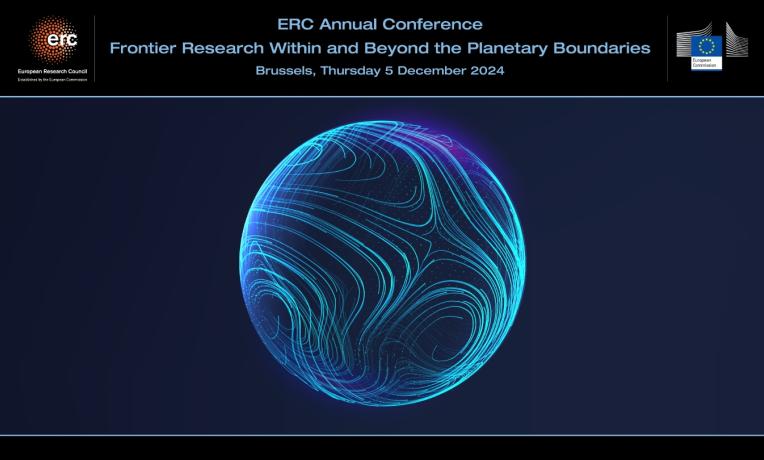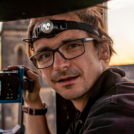ERC Annual Conference 2024: Frontier Research Within and Beyond the Planetary Boundaries

The conference will focus on the key interfaces between the environment, humans, and technology within and beyond the Earth’s planetary boundaries and discuss what frontier research – with a focus on projects funded by the ERC - can offer to address these challenges. The boundaries themselves may be spatial, ecological, biological, physical, geopolitical or mental.
- Read more
Humans have an enormous impact on our planet, so much so that six of the nine identified planetary boundaries have already been reached. Some researchers have even coined the notion Anthropocene to describe the epochal changes that human behaviour is causing. We are also starting to see an impact beyond planet Earth, through the accumulation of space debris.
We do not know whether we, as humans, are alone as a specific form of intelligent life in our universe. Most of the universe remains a mystery, one that is addressed in diverse ways by science, art, or religion. Recent discoveries have shown that there are Earth-like exoplanets that can host life. However, there is ‘no planet B’ for humans in the foreseeable future, so taking care of planet Earth is our responsibility.
Keynote speakers, thematic sessions and the final round table will address questions such as:
- What are the planetary boundaries and tipping points, for whom, and in which timeframe?
- How are we as humans having an impact on and beyond planet Earth, and what are the implications?
- Why and how does planet Earth differ from other planets?
- Is there (intelligent) life elsewhere, how do we know, and do we prepare to interact?
- Why does this matter for the advancement of knowledge and impacts beyond science?
- What is the role of science diplomacy, e.g. to manage global commons such as the Arctic, Antarctica, the ocean floor, or outer space?
- How do science and art interact in exploring the relationship between humans and our environment in the present and future?
Watch the conference
Programme
08.30 - 09.00 Reception and registration
Music: Jazz dreams from the coconut moon by Ádám Dénes
09.00 Welcome
Maria Leptin, European Research Council President
Ekaterina Zaharieva, European Commissioner for Start-ups, Research and Innovation
09.30 Keynotes
Nebojsa Nakicenovic, Deputy Chair, Group of Chief Scientific Advisors to the European Commission, former Deputy Director General and Acting Director General of the International Institute for Applied Systems Analysis - Transformations toward a safe, just and beautiful future for all within planetary boundaries
Q&A
10.30 - 10.45 Coffee break
10.45 - 12.15 Session 1: ENVIRONMENT within planet Earth and beyond
- Read more
Human existence is linked to our natural environment. In this session, we will explore the interplay between planetary boundaries and interrelated processes within the complex biophysical Earth system, and the extent of human influence on these systems. One such system is tropical forests, which have been widely recognised to play an important role in the planet’s atmospheric and environmental balance. We will focus on forest resilience and try to predict whether re-growing forests are able to recover and have the same quality and function as old-growth forests. Finally, we will investigate the habitability potential of the Martian near-surface environment, given the fact that recent missions indicate that environmental conditions on Mars may locally and temporarily exceed the lower thresholds for the existence of life.
Co-Chairs:
Dirk Inze, Emeritus Group Leader at the Center for Plant Systems Biology, VIB, Belgium
Alejandro Martin Hobdey, Head of the Physical Sciences and Engineering Unit, European Research Council Executive Agency
Speakers:
Johan Rockström, Director of the Potsdam Institute for Climate Impact Research and Professor in Earth System Science, University of Potsdam, and ERC grantee (ERA project) - Earth Resilience in the Anthropocene
Lourens Poorter, Professor in Tropical Biology, Wageningen University and ERC grantee (PANTROP project) - Tropical forest succession: drivers, mechanisms, and implications for restoration
Dirk Schulze-Makuch, Professor of Astrobiology and Planetary Habitability and Director of the Center for Astronomy and Astrophysics, Technical University of Berlin, and ERC grantee (HOME project) - Life in Extreme Environments: the hyperarid Atacama Desert on Earth and Mars
12.15 - 13.15 Lunch break
13.15 - 14.45 Session 2: HUMANS and our perceptions and impact on Earth and beyond
- Read more
The many irreversible human impacts on the planet have been demonstrated in regions ranging from the Arctic to the Amazon. In this session we will explore the role of atmospheric aerosols, which are, on the one hand, among the main pollutants affecting air quality, and on the other hand positively contributing to our climate by scattering and absorbing solar radiation. We will examine the effect of anthropogenic activities, mainly the intensity of fishing, on marine biodiversity and ecosystem functioning and compare these ecosystems to before large-scale human impact. Lastly, we will seek the conditions and mechanisms of sustainable planetary stewardship, since the rapid expansion of space activities has led to growing space debris severely affecting the long-term sustainability of the Earth’s orbit.
Co-Chairs:
Dirk Inze, Emeritus Group Leader at the Center for Plant Systems Biology, VIB, Belgium
Lino Paula, Head of the Social Sciences and Humanities Unit, European Research Council Executive Agency
Speakers:
Ilona Riipinen, Professor in Atmospheric Science, Stockholm University, and ERC grantee (ATMOGAIN project) - Clouds and aerosols in the coupled climate system
James Scourse, Professor of Earth System Science and Head of Department, Department of Earth and Environmental Sciences, University of Exeter and ERC grantee (SEACHANGE project) - Quantifying the impact of major cultural transitions on marine ecosystem functioning and biodiversity
Xiao Shan Yap, Assistant Professor of Innovation and Global Governance at the Copernicus Institute of Sustainable Development, Faculty of Geosciences , Utrecht University and ERC grantee - (PLANETSTEWARDS project) - Planetary stewardship in view of Earth-Space sustainability
14.45 - 15.00 Coffee break
15.00-16.30 Session 3: TECHNOLOGY to help discoveries and to mitigate adverse impacts
- Read more
Can technology save us, or at least significantly help? In this session, we will look at some potential solutions to human induced problems. We will explore tools for greenhouse gas removal and solar radiation management from a truly interdisciplinary perspective, examining the conditions under which these technologies might be deployed, as well as their risks and benefits. We will also explore the possibility of creating synthetic cells with life-like properties to understand whether engineered molecular systems could surpass natural capabilities. We will then turn to the philosophical implications of synthetic life and examine how metaphysical concepts interact with cutting-edge natural sciences and technologies.
Co-Chairs:
Dirk Inze, Emeritus Group Leader at the Center for Plant Systems Biology, VIB, Belgium
Philippe Cupers, Head of the Life Sciences Unit, European Research Council Executive Agency
Speakers:
Benjamin Sovacool, Professor of Business and Social Sciences, Aarhus University and ERC grantee (GENIE project) - The sociotechnical dynamics of carbon removal and solar geoengineering
Dora Tang, Professor of Synthetic Biology, University of Saarland, and ERC grantee (MinSynCell project) - Synthetic life: building minimal cells from scratch
Tarja Knuuttila, Professor of Philosophy of Science in the Department of Philosophy, University of Vienna, and ERC grantee (LIFEMODE project) - Modelling biological possibilities: A philosophical perspective
16.30 - 17.45 Round table
Moderator:
Angela Liberatore, Head of the Scientific Department at the European Research Council
Speakers:
Joyeeta Gupta, Professor of Climate Justice, Sustainability and Global Constitutionalism, University of Amsterdam and Co-Chair of the UN Ten High-Level Representatives of Civil Society, Private Sector and Scientific Community to Promote Science, Technology and Innovation for the SDGs
Paolo Ruti, Chief Scientist, European Organisation for the Exploitation of Meteorological Satellites, Germany
Tibor Pacher, Founder and CEO, Puli Space Technologies, Hungary
Ian McDonald, Science-fiction author
Petr Jan Juracka, Natural science photographer and Professor at the Faculty of Natural Sciences, Charles University
Ana Elorza Moreno, Strategic Projects Director, Spanish Foundation for Science and Technology, Spain
17.45 - 18.00 Concluding remarks
Marc Lemaître, Directorate-General for Research and Innovation, European Commission
Invitation to visit the photo exhibition Petr Jan Juracka, a leading Czech natural science photographer
Research libraries
- Thematic reports
Mapping Frontier Research: Transformative change for a sustainable future
ERC Frontier research contribution to the European Green Deal
Mapping Frontier Research: Biodiversity
Mapping Frontier Research: Sustainable Food production and consumption
- Collection of ERC stories
ERC stories on space
ERC stories on oceans
ERC stories on environment
ERC stories on climate
ERC stories on sustainability


















